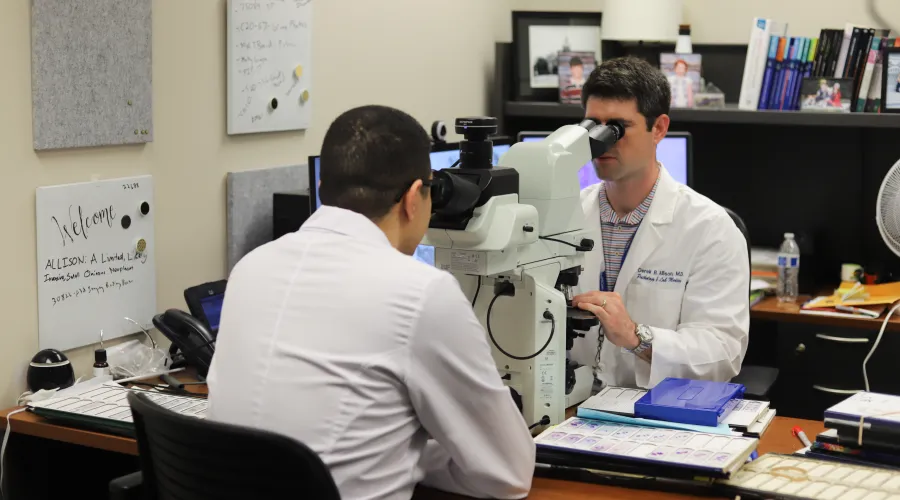
Clinical Divisions
Divisions
Our pathologists, trainees, and staff provide diagnostic services to support the complex tertiary care provided by specialists and sub-specialists in the hospitals we serve. The types of tests performed by our highly-trained staff encompass the entire field of human disease, from everyday diagnostic services to clinical and anatomic laboratories that specialize in bone marrow transplants.
Anatomic Pathology
Autopsy
The mission of our autopsy service is to provide surviving family members and other stakeholders with an accurate evaluation of cause of death, the presence and severity of human disease, potential pain and suffering, and other pertinent questions surrounding the death of a loved one or client.
Cytopathology
The cytopathology laboratory is one of the largest and most active anatomic pathology laboratories at the University of Kentucky, with over 15,000 specimens accessioned annually. Our staff of subspecialty board-certified cytopathologists work together with dedicated cytotechnologists and support personnel to provide the highest quality care for patients in Kentucky and beyond.
Neuropathology
The division of neuropathology is committed to providing quality patient care and research in the numerous areas of neuropathology, including neuro-oncology, neurodegenerative disease, skeletal muscle, peripheral nerve, and ophthalmic pathology. We process over 1,100 clinical specimens per year through our laboratory. With a combined expertise of over 60 years in practice, our neuropathologists offer a diverse range of expertise.
Renal Pathology
The division of renal pathology evaluates native kidney biopsies for various medical diseases and transplant kidney biopsies for allograft-related pathology. Native kidney biopsies are evaluated routinely by light microscopy, immunofluorescence microscopy, and electron microscopy.
Surgical Pathology
The division of surgical pathology provides a wide range of clinical and consultative services at UK HealthCare. The division aims to provide prompt and timely diagnoses as well as special studies for specific diseases. The expertise of sub-specialists in the division and the diversity of surgical specimens also provide an excellent environment for research and training.
Transplant Pathology
The University of Kentucky has active programs for solid organ (kidney, pancreas, heart, lung, and liver) and hematopoietic stem cell transplants. Responsibilities for the interpretation of transplant biopsies in the various organ systems are shared by a group of experienced pathologists in the department of pathology and laboratory medicine.
Cellular and Molecular Pathology
Cytogenetics
The UK College of Medicine Clinical Cytogenetic Laboratory is certified through the Clinical Laboratory Improvement Act (CLIA), the College of American Pathologists (CAP), and is approved by the Childhood Oncology Group (COG). We provide chromosome analysis on a variety of specimens, including amniotic fluid, chorionic villus samples, tissue biopsies, products of conception, peripheral blood, bone marrow, lymph nodes, and solid tumors.
Flow Cytometry
Flow cytometry laboratory which is a part of the immuno-molecular division is highly integrated with our hematopathology service to offer 10-color multiparametric flow cytometry testing. This clinical service is used to test for a variety of conditions including lymphomas, leukemia, plasma cell neoplasms, Paroxysmal Nocturnal Hemoglobinuria (PNH), HIV monitoring for TBNK, and immunodeficiency and autoimmune disorders.
Genomics
Our center provides a wide range of genomic services for clinical care, including chromosomal microarray, genotyping for pharmacogenetics, and DNA sequencing (both capillary and next-generation sequencing) for cancer and genetic disorders. The overall mission of our laboratory is to accelerate the clinical genomics, precision medicine, and genomic research interests at the University of Kentucky by providing cutting-edge genomic technology services.
Clinical Pathology
Hematopathology
The division of hematopathology is highly integrated with the flow cytometry service and provides consultation in all aspects of hematopathology, including peripheral blood and bone marrow morphologic review and evaluation of lymph nodes and solid organs for involvement by hematolymphoid processes.
Histocompatability
Histocompatibility testing involves the identification of HLA antigens/alleles (tissue typing), HLA antibody screening and identification, and flow cytometry based crossmatching. The vast majority of histocompatibility testing is performed in the setting of solid organ and hematopoietic stem cell transplantation.
Microbiology
Clinical microbiology encompasses over 40 laboratory technologists and basic science scientists providing services under the umbrella of clinical microbiology. We have a breadth of training and racial diversity within the section, with employees originating not only from the Commonwealth of Kentucky, but also from five other states and three countries.
Special Chemistry
The special chemistry laboratory at the University of Kentucky performs a variety of laboratory testing from endocrine, infectious disease, and autoimmune disorders to therapeutic drug monitoring and drugs of abuse screening and confirmation. The special chemistry laboratory performs testing for a variety of endocrine disorders by testing analytes such as: testosterone, cortisol, insulin, c-peptide, thyroglobulin, parathyroid hormone, and hemoglobin A1c.
Transfusion Medicine
The division of transfusion medicine provides comprehensive and state of the art services in transfusion medicine, therapeutic apheresis, and peripheral stem cell collections. The service supports a Level 1 adult trauma center, Kentucky Children’s Hospital (Level 1 pediatric trauma center), active solid organ and bone marrow transplant programs, and Markey Cancer Center, Kentucky’s only NCI-designated center which was recently designated as one of the top 50 Cancer Centers in the nation.
Core Lab
The University of Kentucky Core Laboratory is a state-of-the-art clinical testing facility providing timely, accurate, and reliable diagnostic results to support patient care across UK HealthCare and affiliated providers. Operating 24/7, the Core Lab plays a critical role in supporting the University’s Level 1 Trauma Center, as well as routine and complex inpatient and outpatient needs. Equipped with advanced automation and analytical technologies, we offer a wide range of high-volume testing services, including routine chemistry, hematology, coagulation, and urinalysis.